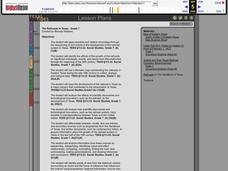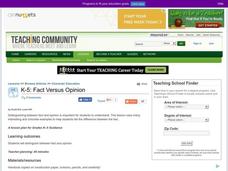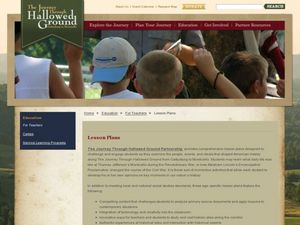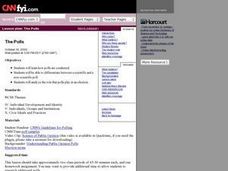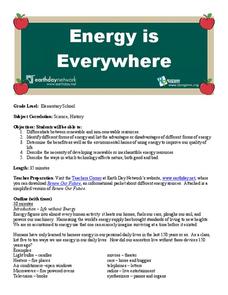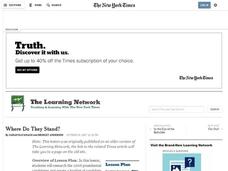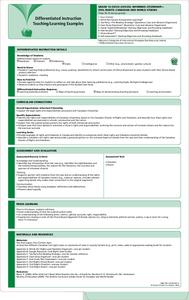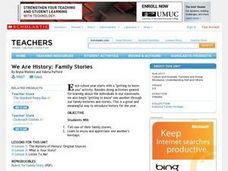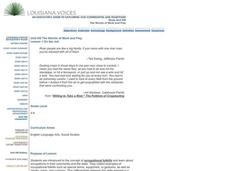Curated OER
The Railroads in Texas
Seventh graders differentiate between, locate, and use primary and secondary sources, such as biographies from the Handbook of Texas. They analyze the effects of scientific discoveries and technological innovations, such as the railroad,...
Curated OER
Fact Versus Opinion
Learners differentiate between fact and opinion. They define fact and opinion, then listen to and identify examples of each. Students identify different books where facts and opinions can be found, and cut out newspaper and magazine...
Curated OER
Lesson Plan - The Barbara Frietchie Story – Fact or Fiction?
Young scholars differentiate between fact and legend. In this Barbara Freitchie lesson, students read poetry and non-fiction accounts regarding the story of Freitchie. Young scholars analyze the story of the American patriot to determine...
Pace University
Community Helpers
Differentiate instruction with a unit focused on community helpers. A pre-assessment levels scholars into three groups. Learning contracts offer participants the choice of activities to complete and show what they know about specific...
Curated OER
The Polls
Students obtain how polls are conducted. They differentiate between scientific and non-scientific poll. They analyze the role that polls play in an election.
Curated OER
HISTORY OF SCIENCE: ASTRONAUTS
Students study the pioneers of space exploration and travel; identify some of the early astronauts who prepared the way for others; examine the social and political conditions at the dawn of the Space Age; and differentiate among space...
Curated OER
Pre WWII Germany - Inflation
Eleventh graders differentiate between inflation and hyperinflation. They explain the economic conditions in Germany before WWII and the roles of government in a market economy. They analyze the importance of keeping inflation under...
Curated OER
House Opposite
Students read the short story House Opposite to help them differentiate between the terms "religion" and "spirituality." Students make connections to situations of people who struggle between the two in the real world by creating a...
Curated OER
My Family: Past, Present,
Second graders explore the lives of actual people who make a difference in their everyday lives. They differentiate between events that happened long ago and events that happened yesterday by studying their family histories. The unit...
Curated OER
Energy is Everywhere
Students differentiate between renewable and non-renewable resources and identify the different forms of energy and list the advantages or disadvantages of different forms of energy. They also determine the benefits as well as the...
Curated OER
Invention/Innovation/Creative Thinking/Opportunities/Ideas
Students, while examining inventions and innovators, identify, differentiate and discuss five Canadian inventors/innovations. After applying creative thinking strategies to a promotional piece, students brainstorm patents.
Curated OER
Let the Campaign Begin
Learners differentiate between positive and negative personal attributes and select a fictional character for nomination who personifies the qualities of a good leader. They use the Internet to learn about the election process and write...
Curated OER
Where Do They Stand?
In this presidential election worksheet, young scholars research the 2008 presidential candidates and create a booklet of candidate profiles that clearly differentiate each one. They also assume the identity of one of the candidates and...
Shell Education
Leaders from the 1790s
The Founding Fathers contributed to the United States in many ways. Class members explore various Founding Fathers through research, group work, and realia. The final product of group work are posters and artistic representations of...
Ontario
Informed Citizenship—Civil Rights
To launch a study of civil rights, class members brainstorm rules and expectations of behaviors at home, in school, in the workplace, and in sports. They then look at civil rights cases and examine the rules embedded in these cases.
Curriculum Development Institute
Factors for Economic Integration in Western Europe since 1945
While the European Union has been a part of economic landscape for decades, it grew out of a period of economic integration after World War II. Using a round table method, class members analyze and discuss the events leading up to the...
EduGAINs
Consumerism, Me and the Natural Environment— Canadian and World Studies
Just as no man is an island, no country is totally independent of other countries. To understand the impact of individual consumer decisions on the global natural environment, class groups consider how the stuff they purchase connects to...
EduGAINs
Coureurs de Bois, First Nation Peoples, and the Fur Trade
The interactions between the Coureurs de bois (runners of the woods) and the First Nation Peoples as they engaged in the fur trade are the focus on this Canadian history exercise. Kids select learning centers based on their learning...
EduGAINs
Migration—Push and Pull Factors
What causes people to move from one place, one city, or one country to another? Using the provided migration questionnaire, learners interview family members about the factors that cause them to be pushed from an area or pulled to an area.
EduGAINs
Governmental Apology for the Aboriginal Experience—Canadian and World Studies
What constitutes an effective apology? After considering a series of scenarios, class members develop criteria for an effective apology and then use these indicators to evaluate Canada's Prime Minister Harper's apology to former...
Curated OER
Chinese Mythology
Seventh graders examine creation myths of China, discuss how myths reflect Chinese culture, differentiate between Chinese and Greek creation myths, and explore place of myths in Chinese culture as compared to their place in other...
Curated OER
Supply and Demand
Young scholars define economic terms, list three conditions that must be present in order for demand to exist, define law of supply and demand, differentiate between buyer's and seller's markets, examine concept of elasticity, view...
Curated OER
We Are History: Family Stories
Students examine their own family heritage and share family stories with the class. They differentiate between primary and secondary sources, and bring in and write about three artifacts from their family. They conduct an interview...
Curated OER
On the Job
Students identify the concept of occupational folklife and learn about occupations in their community and the state. Then they collect examples of occupational folklife such as special terms, equipment, or gestures, as well as stories,...
Other popular searches
- Differential Equations
- Differential Rotation
- Differential Heating
- Differential Calculus
- Differential Correction
- Differential Leveling
- Math Differential Equations
- Differential Operators
- Differential Instruction
- Calculus Differentials
- Differential Extrema
- Differential Aptitude


